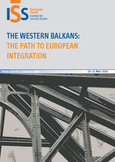You are here
The Western Balkans: the path to European integration

The EUISS organised in collaboration with the FPI a seminar in Sarajevo on 'The Western Balkans: the path to European integration'. During the seminar Denisa Sarajlic-Maglic presented a Comparative Report for 2009 on Monitoring the BiH Integration Processes.
Jacques Rupnik, EUISS senior associate researcher, highlighted during the conclusion of the seminar a number of basic guidelines for the EU to successfully move the Western Balkans away from crisis management and toward European integration.
EUISS Director, Álvaro de Vasconcelos, made six specific recommendations during his summary of the debates for the future of the European integration process of the Western Balkans:
- Enlargement is the best European strategy for the Balkans and a way to move from crisis management to democratic inclusion. All policies that would result in enlargement fatigue should be avoided.
- The EU needs to develop a coherent policy towards the Balkans, taking advantage of the reforms brought about by the Lisbon Treaty; namely, through a coordinated effort of not only the European institutions, but the EU’s member states as well, in particular those of the Balkan region.
- Should the accession process be based on the merits of each individual country, a sub-regional approach that would collectively bring Bosnia and Herzegovina, Kosovo and Serbia into the Union at the same time would be in Europe’s interest.
- Positive conditionality is an important approach to creating the conditions for integration if the reforms being implemented are perceived by all citizens as being in their interest. This was the case with the visa-free objective in Bosnia and Herzegovina, and is already the case with the citizens of the former Yugoslav Republic of Macedonia, Montenegro and Serbia. Other reforms gaining similar levels of public support should be sought out, most notably in the field of education.
- The EU should pay particular attention to the role of civil society in the integration process. A network of civil society organisations should be supported and should meet regularly, especially alongside Balkan member states of the EU in summits and ministerial meetings. Their perspective should be heard and taken into account in EU decision making.
- Summits and ministerial meetings following the Butmir talks should be regular but they should only be convened where concrete progress is achievable.